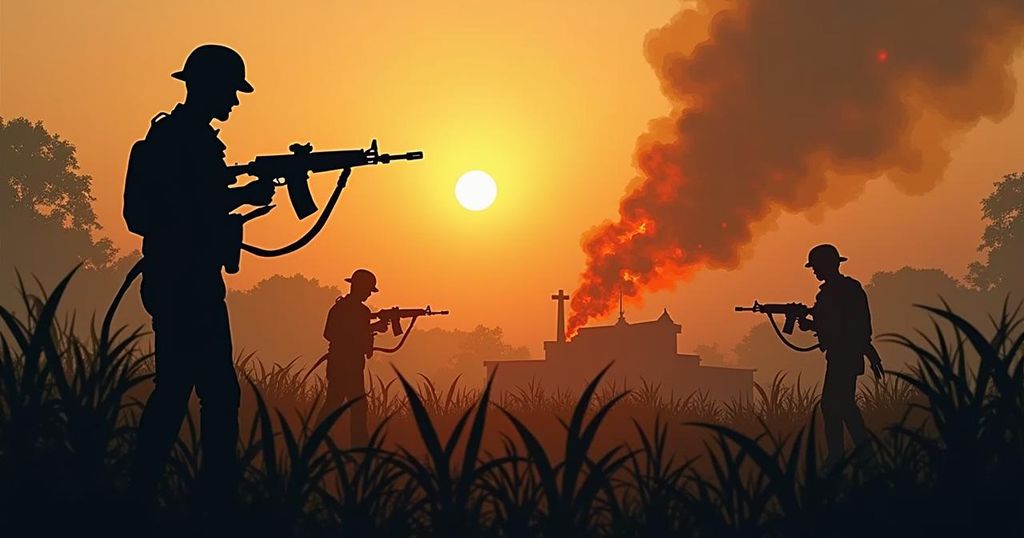Myanmar Civil War Intensifies Drug Trade, Thailand Reports Surge in Seizures

Thailand has experienced a significant rise in drug trafficking from Myanmar due to ongoing civil war conditions. Methamphetamines and heroin seizures have surged, revealing the extent of organized crime and production capabilities in the region. Despite increased law enforcement seizures, the market prices of these drugs continue to decline, suggesting rampant trafficking eluding authorities.
BANGKOK (Reuters) – A notable increase in the illegal drug trade has been reported in Thailand, attributed to escalating tensions in Myanmar due to ongoing civil conflict. A senior official from the Office of the Narcotics Control Board (ONCB) remarked that there has been a sharp rise in the seizure of methamphetamines and heroin this year, correlating with the intensification of the regional drug trade fueled by the civil war. Apikit Ch. Rojprasert, the deputy secretary-general of ONCB, identified the northern region of Thailand as the primary route for drug trafficking, primarily involving the transportation of methamphetamine pills and crystal meth, also known as ice, via mountainous paths or the Mekong River. The emergence of organized crime networks cooperating with various militias and resistance groups has led to the establishment of large-scale drug manufacturing facilities, referred to as “super labs,” in Myanmar’s Shan and Kachin states. Notably, while the Myanmar military government has previously asserted its commitment to cooperating with neighboring nations in combating narcotics, it has refrained from commenting on the issue in this instance. “Because of the armed conflict, the drug trade is one of the factors used to fund weapon purchases or drive the fighting forces,” Mr. Apikit communicated to Reuters in an interview. The escalating armed conflict in Myanmar has positioned the military against an armed resistance comprising various ethnic rebel factions, particularly following the military coup in 2021. Data reveals a staggering 172% increase in methamphetamine pill seizures in the first eight and a half months of this year across northern provinces, yielding 346 million pills seized compared to the total for the entirety of 2023. Additionally, crystal meth seizures rose by 39% over the same time frame, reaching 6.48 tons, while heroin seizures nearly surged to seven times their previous amount, totaling 327 kg. Despite the amplified drug seizures, the market price of methamphetamine pills in Thailand has considerably decreased, indicating that a more significant volume of drugs remains undiscovered by authorities. The average cost per tablet has plummeted from approximately 80 baht in 2017 to around 25-30 baht in 2024. General Narit Thanwornwong, the commander of Thailand’s drug enforcement unit in the northern border, estimated that over 50 million meth pills are likely poised for trafficking into Thailand, indicating a robust and ongoing challenge. The significant increase in drug seizures across northern Thailand has been noted since the 2021 coup in Myanmar, marking rises of 284% in crystal meth, 201% in amphetamine tablets, and 77% in heroin based on ONCB statistics. ($1 = 32.1900 baht) (Reporting by Panu Wongcha-um, Panarat Thepgumpanat and Reuters staff, Editing by Martin Petty and Miral Fahmy)
The ongoing civil unrest in Myanmar has created an environment conducive to the expansion of the drug trade, significantly impacting neighboring Thailand. The regions involved, particularly Shan and Kachin states, are known for their opium cultivation and now increasingly for synthetic drug production. The dynamics introduced by organized crime groups cooperating with militias have exacerbated the situation, turning the ongoing conflict into a lucrative opportunity for illegal drug trade.
In summary, the civil war in Myanmar has serious ramifications for Thailand, leading to a pronounced increase in drug trafficking and the establishment of vast illegal drug manufacturing operations. Statistics reflect alarming trends in the seizure of methamphetamine and heroin, underscoring the multidimensional impact of the conflict. As the situation evolves, the collaboration between law enforcement agencies in both countries remains crucial in addressing the burgeoning drug trade and its associated challenges.
Original Source: www.usnews.com








